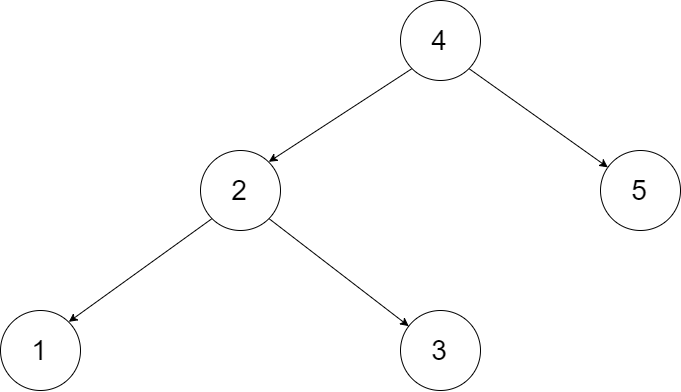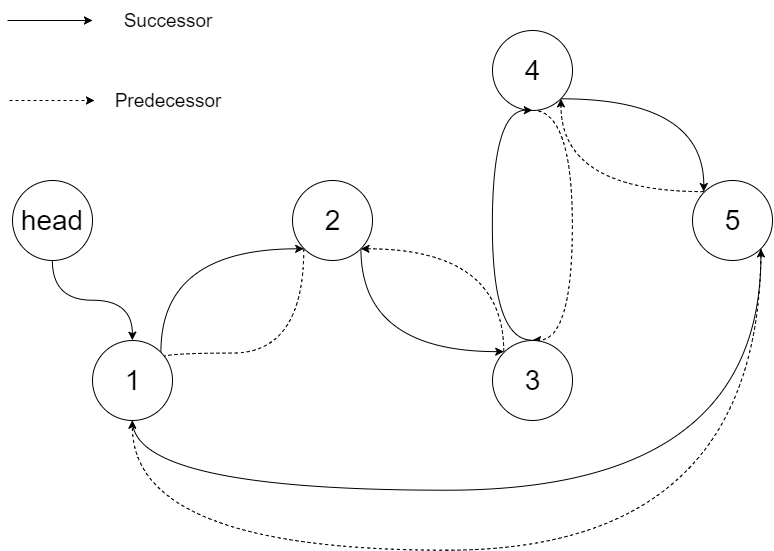LeetCode 426. Convert Binary Search Tree to Sorted Doubly Linked List
原题链接在这里:https://leetcode.com/problems/convert-binary-search-tree-to-sorted-doubly-linked-list/
题目:
Convert a BST to a sorted circular doubly-linked list in-place. Think of the left and right pointers as synonymous to the previous and next pointers in a doubly-linked list.
Let's take the following BST as an example, it may help you understand the problem better:

We want to transform this BST into a circular doubly linked list. Each node in a doubly linked list has a predecessor and successor. For a circular doubly linked list, the predecessor of the first element is the last element, and the successor of the last element is the first element.
The figure below shows the circular doubly linked list for the BST above. The "head" symbol means the node it points to is the smallest element of the linked list.

Specifically, we want to do the transformation in place. After the transformation, the left pointer of the tree node should point to its predecessor, and the right pointer should point to its successor. We should return the pointer to the first element of the linked list.
The figure below shows the transformed BST. The solid line indicates the successor relationship, while the dashed line means the predecessor relationship.

题解:
The order is inorder traversal.
Use stack to help inorder traversal. When root is not null, push it into stack and move to its left child.
When root is null, stack is not empty, pop the top and append it to current node's right. Then root = top.right.
When root is null, stack is empty, assign current node's right to dummy.right, and dummy.right.left = current.
Time Complexity: O(n).
Space: O(h).
AC Java:
1 /* 2 // Definition for a Node. 3 class Node { 4 public int val; 5 public Node left; 6 public Node right; 7 8 public Node() {} 9 10 public Node(int _val,Node _left,Node _right) { 11 val = _val; 12 left = _left; 13 right = _right; 14 } 15 }; 16 */ 17 class Solution { 18 public Node treeToDoublyList(Node root) { 19 if(root == null){ 20 return root; 21 } 22 23 Stack<Node> stk = new Stack<Node>(); 24 Node dummy = new Node(); 25 Node cur = dummy; 26 while(root!=null || !stk.isEmpty()){ 27 if(root != null){ 28 stk.push(root); 29 root = root.left; 30 }else{ 31 Node top = stk.pop(); 32 cur.right = top; 33 top.left = cur; 34 cur = cur.right; 35 root = top.right; 36 } 37 } 38 39 cur.right = dummy.right; 40 dummy.right.left = cur; 41 42 return dummy.right; 43 } 44 }
AC Python:
1 """ 2 # Definition for a Node. 3 class Node: 4 def __init__(self, val, left=None, right=None): 5 self.val = val 6 self.left = left 7 self.right = right 8 """ 9 10 class Solution: 11 def treeToDoublyList(self, root: 'Optional[Node]') -> 'Optional[Node]': 12 if not root: 13 return root 14 dummy = Node(0) 15 cur = dummy 16 stk = [] 17 while root or stk: 18 if root: 19 stk.append(root) 20 root = root.left 21 else: 22 top = stk.pop() 23 cur.right = top 24 top.left = cur 25 cur = cur.right 26 root = top.right 27 cur.right = dummy.right 28 dummy.right.left = cur 29 return dummy.right 30


 浙公网安备 33010602011771号
浙公网安备 33010602011771号